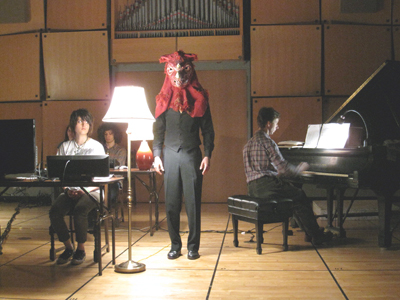
Virginia Saya has seen more than a few students do a 180-degree turn.
That sharp reversal of opinion frequently happens, suggests Saya, a Ph.D. in Musicology, professor of music in Loyola Marymount University’s Department of Music and director of the Francis A. Sinatra Opera Workshop, when she takes students to professional opera performances in L.A. “They see these marvelous performances and they begin to love opera,” Saya said. She even knows some students who have come to LMU hating opera and ended up loving it.
The students’ enthusiasm becomes an important ingredient in the success of the Sinatra Opera Workshop. “To have a staged opera every semester in a liberal arts college is rare,” she said. Saya sees the benefits of her music majors and musicians picking up the rigor of LMU’s curriculum. “Students with a liberal arts education bring so much intelligence to the roles for people their age,” she said. “I love working with LMU singers.”
Much like its namesake, the Sinatra Opera Workshop had a humble beginning. “I founded the opera program with a budget of $0,” Saya said. “But we were a scrappy group doing this as a labor of love.” For the first production, in 1990, nine years before the Sinatra endowment, Saya and her students sewed their own costumes and went to Goodwill to get props.
The 1992 production of Puccini’s “Gianni Schicchi” was “our real coming of age,” according to Saya. This production caught the attention of Thomas P. O’Malley, S.J., LMU’s 13th president. Saya said that O’Malley attended every opera and that he wanted to get a budget for the program. O’Malley took the idea to Frank Sinatra, a benefactor of the university, who agreed to endow the program. The paperwork was sorted out and in 1999 the Opera Workshop became the Francis Albert Sinatra Opera Workshop.
When asked about the workshop name, Saya usually reminds the listener that opera was the music Sinatra grew up with, the music his family listened to at home. She adds that he was described in early programs as “Francis Albert Sinatra, American baritone,” as classical singers were often listed. “The voice didn’t go the way of opera, but he never lost his high regard for the art,” Saya said.
Saya said that she looks for a particular type of singer or musician when casting an opera: “Of course I’m looking for a good actor, musicianship, a beautiful sound … But what I want most is somebody who scored in the 90th percentile of every reading comprehension exam they ever took.” Those students, Saya said, come with an interpretative maturity that makes playing opera characters more rewarding. “The opera characters are so difficult to comprehend and penetrate that a singing actor has to have a broad knowledge and depth to react to subtle things that are delivered by another singer on stage.”
In addition to the traditional opera works, Saya has introduced her classes to modern works, including John Cage’s “Europera 5,” which had its West Coast premiere in 2011 at LMU. The spring 2014 workshop is again presenting “Europera 5,” on March 14 and 15 at 8 p.m. and March 16 at 7:30 p.m. in Murphy Recital Hall.



